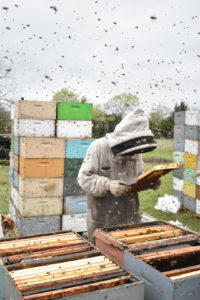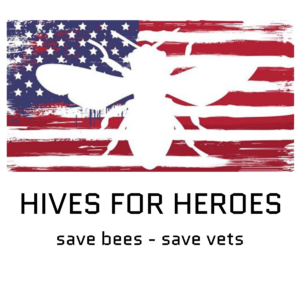Blueberries and Bees
Army Veteran turned blueberry farmer and beekeeping mentor to other veterans
My wife and I started our farm in 2010 by planting 600 blueberry bushes. I had done a lot of research on blueberries during my deployment overseas the previous year, or a least I thought I did. The plan was to become more self-sufficient and build a small farm for retirement.
We took online classes and some seminars on farming. All of which were helpful but, you just don’t know what you don’t know. There are so many facets to any agricultural venture that unless you’ve grown up doing it or have someone to mentor you, you’re destined for the school of hard knocks and hopefully you don’t lose your shirt. The blueberries have done great despite challenges with pests and a little over fertilizing the first year (we burnt about 40 young bushes).
I think it was about 2014 or 2015 that my wife decided we needed bees to pollinate the berry bushes. So, happy wife = happy life. I found a bee class for us to attend over the winter and in the spring we purchased our first 2 nucs. In the beginning I wasn’t very crazy about bees. But after 2 years of being a proficient bee killer, my type A personality kicked in and I started to research and learn more about bees. As I learned more I started to realize what amazing creatures they are which fueled my desire to learn more. Over the course of the next few seasons I joined several bee clubs, got to know beekeepers from across the state and developed a support network. I even started a second business focused on the bee’s, which after 3 years is actually starting to pay for itself.

Beekeeping is an easy transition from military life, as Tom puts on his uniform (bee suit), goes out in the field with his battle buddy (mentor or newbee), with a mission to check on the bees (which can also be a threat)
After 20 years of service in the United States Army, I had experienced different levels of PTSD and injury. Working with the bees improved my life on so many levels, especially mentally and physically, through post traumatic growth. Beekeeping is an easy transition from military life. I put on my uniform (bee suit), go out in the field with my battle buddy (mentor or newbee) with a mission to check on the bees which also happen to be the threat! Using beekeeping processes, training, and knowledge, I am able to assess the hive and complete the appropriate steps to keep the bees safe and healthy. At the end, I can walk away with a sense of accomplishment and plan for the next time I check on them. The other great thing about bees is that if I’m having a bad day, dizzy or having a migraine the girls take care of themselves. So it works, I take care of the bees and the bees take care of me!

Hives for Heroes is a national military veteran non-profit organization focusing on honey bee conservation, suicide prevention, and a healthy transition from service
Over the past few years I’ve talked with several other Veteran beekeepers that share my thoughts on the healing aspect of beekeeping and how we could help others. Recently, I learned about the Hives for Heroes program and have signed up to be a mentor to help my brothers and sisters in service experience the benefits of beekeeping without facing the learning curve alone. Hives for Heroes is a national military veteran non-profit organization focusing on honey bee conservation, suicide prevention, and a healthy transition from service. We are a national network of beekeepers and veterans providing connection, purpose, and healthy relationships fostering a lifelong hobby in beekeeping.
I am currently mentoring three veterans. There is a steep learning curve when starting beekeeping, and it’s not cheap. Losing a hive over winter or not knowing what you’re doing on a daily can cause much stress. I am so honored to be working with these veterans and able to share my experiences and passion with them! It gives me so much joy to see them experience the same thrill, hunger, and excitement to work the bees and learn more. Each one is interested in beekeeping for their own reasons whether it be PTSD therapy, homesteading, or a new hobby! My focus is to teach them the science of beekeeping and let them develop their own art of beekeeping.
Hives for Heroes is a national military veteran non-profit organization focusing on honey bee conservation, suicide prevention, and a healthy transition from service. We are a national network of beekeepers and veterans providing connection, purpose, and healthy relationships fostering a lifelong hobby in beekeeping. If you are interested in being a beekeeping mentor to veterans across the county, please visit www.hivesforheroes.com. Financial donations are also encouraged to help support veterans starting their beekeeping journey.

